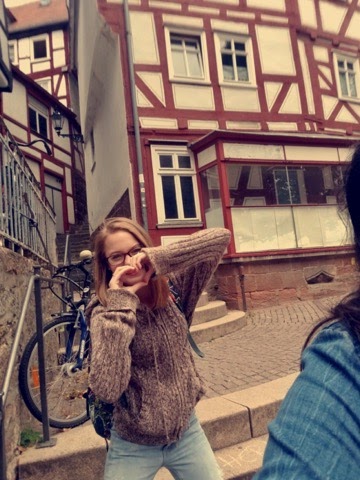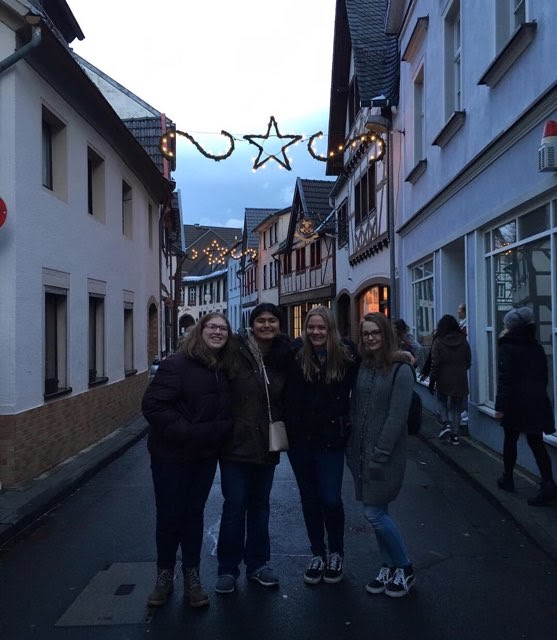Home Away from Home: Hailee Eiker’s Experience as a Foreign Exchange Student

Hailee Eiker, 18, went to Germany as a foreign exchange student during her junior year. While she was away, Eiker was able to make new friends, family, and fond memories.
February 14, 2020
Foreign exchange students come from all over the world to experience different cultures during their time in school. They use foreign exchange programs as an opportunity to meet new people of diverse backgrounds, learn about the various culture and customs of an unfamiliar country, and experience new moments in and out of school. However, when most people hear of foreign exchange students, they usually think of foreign students coming to America, not the other way around.
Just like students of other countries can come to America, American students can also choose to explore the world and its many nations through the exchange student programs. While plenty of people may have heard stories of foreign exchange students or even been friends with a foreign exchange student, many also don’t hear the stories of the American students that have participated in the program, as well. These students who have been abroad also have their experiences to tell.
Hailee Eiker, a senior who participated in the Congress-Bundestag Youth Exchange during her junior year, is one of many American foreign exchange students. Eiker, who spent a year in Diepholz, Germany, had numerous reasons for wanting to engage in the program.
“I have ancestors who were in Germany. I also was kinda going through a little tough time here at home, so like, in America, I was having a bit of a tough time. So, I just wanted to escape a little bit. And then, it just was a really good opportunity because the specific program I went on was completely paid for by the government, it was a government sponsored program. So, it was just a really good opportunity that I didn’t want to miss,” Eiker stated.
Eiker went to Germany hoping to get a glimpse of Germans and the lifestyles and satisfy her curiosity of what it was like to live in another country. Eiker also wanted to go to improve her fluency in the German language.
“I had learned it for two years before I went there. I was still really bad at the language; people in my class would beg to differ, but, trust me, when I got over there, I was very confused,” Eiker said as she described her process of learning German.
To improve her language comprehension, her host family would speak to her in more basic German, and if she didn’t understand, switch to English. At school, she would underline the words she didn’t understand, and then go through and translate the words she didn’t know.
Eiker also noted that while there was a bit of a language barrier, it didn’t affect anything, as most Germans spoke English, and she was able to clear up any misunderstandings she might have had with others.
Eiker recalls what the first day of arriving in Germany was like for her.
“When we first got there, we arrived in Frankfurt. We spent a bit of time there, and it was pretty hectic because it was fifty different Americans running through the Frankfurt airport, and eventually, we got to the bus that was going to take us on a three-hour bus ride to the castle where we were staying for our language camp. But even that was hectic because we had to take our entire luggage – mind you we were staying there for a year, so it was a lot of luggage – we had to take all of our luggage uphill, like slightly uphill but still uphill, for, like, 20 minutes to get to the bus,” Ekier told.

“I miss the public transportation a lot; [it] made things a lot easier. I miss the stores. My host family would go shopping every week to get stuff for meals, and everything would be really fresh when we ate it and it was really nice. I also like how they used bikes more than they used cars; it’s good for the environment.” Eiker named as some of the elements she would miss from Germany.
After some frenetic dealings with a girl who thought her luggage was lost and some more trekking up stairs, Ekier and the other exchange student made it to the castle they’d be staying in.
“So then we signed in, but of course it was a castle, so there were a ton of stairs, and I had to go up, like, five flights of stairs to get to my room, and I was struggling with my luggage. So, like, one of the people, one of the Germans, was like ‘I’m just gonna help you’ so he took all my luggage up to my room for me; it was pretty great.”
After staying in the Schloss Wittgenstein castle for a month, students were either picked up by their host families or sent to their homes by trains.
“We had to run through the German train stations for the first time ever, some of us taking like nine-hour train rides to get to our host families. I think mine was like six, seven hours and I think I had to change trains maybe like twice,” Eiker said. Despite her first experience she had with the trains, Eiker later found them convenient, as she was easily able to get a train ticket and catch a train to meet with her friends. After some guidance around the train stations from chaperones, all the students were able to get to their homes.
While staying in Germany, Eiker stayed with a host family that consisted of a mother, a father, two sisters and plenty of pets.
“My host mom was actually my religion teacher, which was quite interesting. My host dad was also a teacher, but not at the school I went to, and then I had two younger host sisters. We also had a lot of animals. We had a dog, two bunnies, and then we had five quails,” Eiker listed.
Eiker’s host family valued quality time, as the three girls rode their bikes to school together, or were taken by their host mom if she had a class that morning. The family also spent a lot of time together during meals. The parents would often make breakfast and dinner for the family to gather around and eat together.
Eiker attended Graf-Friedrich-Schule Gymnasium, gymnasium being the “track” a student attended if they planned on going to college. Eiker’s first day at school was an interesting one, as her class was cancelled. Eiker explained that in Germany, schools don’t have substitutes. So, if a teacher can’t make a class, the class is simply cancelled. However, this worked in Eiker’s favor.
“We just sat there, for like 45 minutes because we didn’t have a class, and we just goofed around. It was pretty great,” Eiker said. After a relaxed first day, Eiker went home, had lunch, and shared the details of her first day with her mother.
Although her overall experience was good, Eiker still had her share of hardships, including maintaining grades and making friends.
“It was pretty hard. Some of the better friends that I made were actually other exchange students. There were three other exchange students that I met who were in the same city as me. One was from Switzerland, one was from Turkey, and one was from South Africa. And they were all pretty good friends of mine. One of them was in the same class as me, the other two danced with me and they also went to the same school as me, but I met them through dance because they weren’t in the same class as me. It was just kinda hard just because it was slightly because of the language. I spoke a more formal version of German obviously because that’s how I learned it and I didn’t really know the slang over there, so it was harder for me to speak how they spoke, so I didn’t seem as cool to them or whatever. So, it was kinda hard for me to make friends, but the people who actually made an effort to speak to me and understand what I was saying, those are the friends that I got really close with.”
Eiker had fun speaking with the other exchange students and is still in contact with some of her friends to this

day.
There were many notable aspects of German school that differed from American schools, including how blocks were set up, the different directions students could take in school, and the fact that most German students have known each other for most of their school careers.
“Instead of having every class has different students in it, for every single core class over there, you would have the same exact people in your class. So like, they had different assigned classes, so there’d be class A, class B, class C, class D, and all those classes would have the same people in it. There were only a few classes where you had different people within your classes. That would be like religion, art, theater, but all the rest of the classes, you had with the same people everyday and typically they would have all those same people from the time they were in third grade, so they’ve known each other for a long time and they’ve been in the same class with each other for a long time.”
Schools in Germany also don’t have school sports and activities, which caused Eiker to be active beyond the school day through volleyball and dance classes.
Eiker acknowledged some differences between American and German citizens as well.
“People wise, Germans are very straightforward. Americans are more passive when they don’t like something, but Germans will just tell you they don’t like it. Also, they’re really into, like, environmental things. Like, whenever you buy glass water bottles over there, you can turn them in and you get back what’s called a pfand, so when you buy the water bottles, you’re paying for the water and the bottle, but then once you get the bottles back, you get paid for the bottles.”
Eiker also saw a shared interest in Tik Tok and Instagram between German and American kids, although Germans tend to use Instagram less.
As her experience came to an end, Eiker recalled what her last day at school was like.
“It was honestly a pretty crazy day because the last day of school they were having this climate strike. So I went to the climate strike, and then I came back to school and there was like, two classes left, so I said goodbye to the people who I needed to say goodbye to at the climate strike, and then I went to school. I said goodbye to some of my teachers; I’d said goodbye to some of them previously because I knew I wouldn’t see them again, because I didn’t have their class again. So I said goodbye to the people in my class who I had become friends with, and then the two friends that I was really close with, we just like, hugged and we cried for awhile. I looked like a crazy person some more, and then I rode my bike home with tears in my eyes and it sucked.”
After leaving school, Eiker was then left to say goodbye to her host family.
“It was actually kind of weird because my host dad and the older host sister had left the day before I had to leave because they were going to visit their grandpa, my host dad’s dad, so they had already left so we had said our goodbyes; and saying goodbye to the host sister was really hard, we were both crying and then I had to go to school still, so I went to school, and then the next day, when I had to leave, we went to the train station. We ended up going to the Bremen train station rather than the one in Diepholz because we just wanted to have that long car ride and it was easier because then I wouldn’t have to switch trains. So, they dropped me off, we were waiting on the platform for like half an hour before the train showed up, and then I got on the train and we were waving goodbye. I was crying, my host sis was crying, my host mom was crying. We all had big hugs beforehand, and I was just sitting there, and right before the door closed, my host mom took out a little packet of tissues, tosses it to me on the train, and the door closes, and I lean and I’m just using the tissues that she threw at me, crying, trying not to look like a crazy woman on the train and then, you know, I left.”
After leaving her host family, Eiker spent her last day in Germany in a hotel, preparing to go to the airport and leave for home.
Eiker was able to make new friends and insert herself into a new culture through her visit to Germany. Her experience can provide insight for others about partaking in new cultures and creating new bonds with various people. With everything she’s learned, she can now share her story and insight with others.








